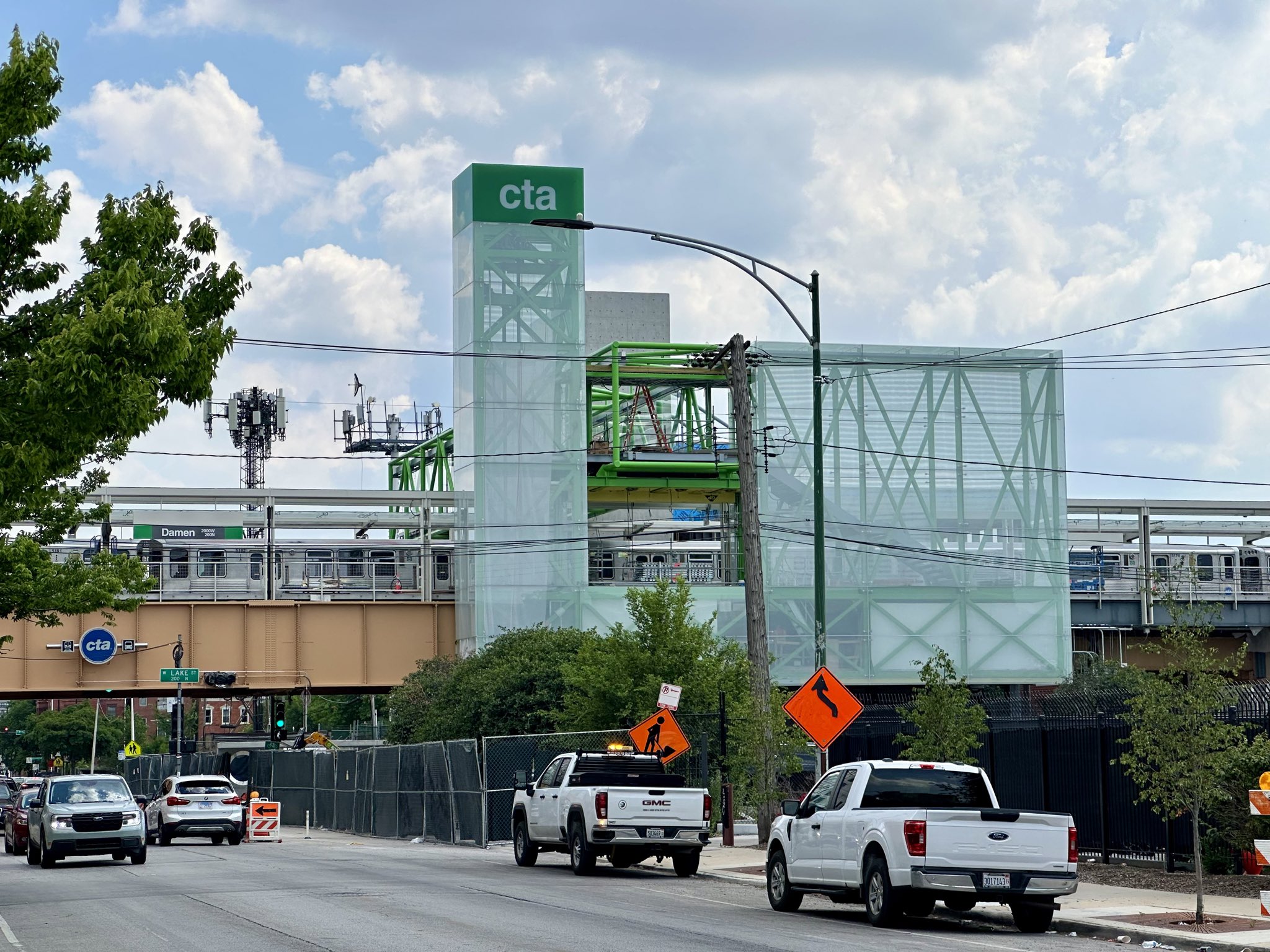
The June 25 CTA board meeting wasn’t exactly earth-shattering, but it was busy. So busy, in fact, that the monthly construction update was postponed until July. Items discussed yesterday included the upcoming Green Line station on Damen Avenue; the official seating of a politically connected West Side pastor to the board; the approval of an intergovernmental agreement for a pilot of a new CTA/Metra/Pace one-day pass; and vending machine equity.
What’s in an ‘L’ station name?
Again, there was no construction update on the in-progress Green stop on Lake Street at Damen on the Near West side, two blocks from the United Center, scheduled to open in July. But the CTA board did approve its official name...
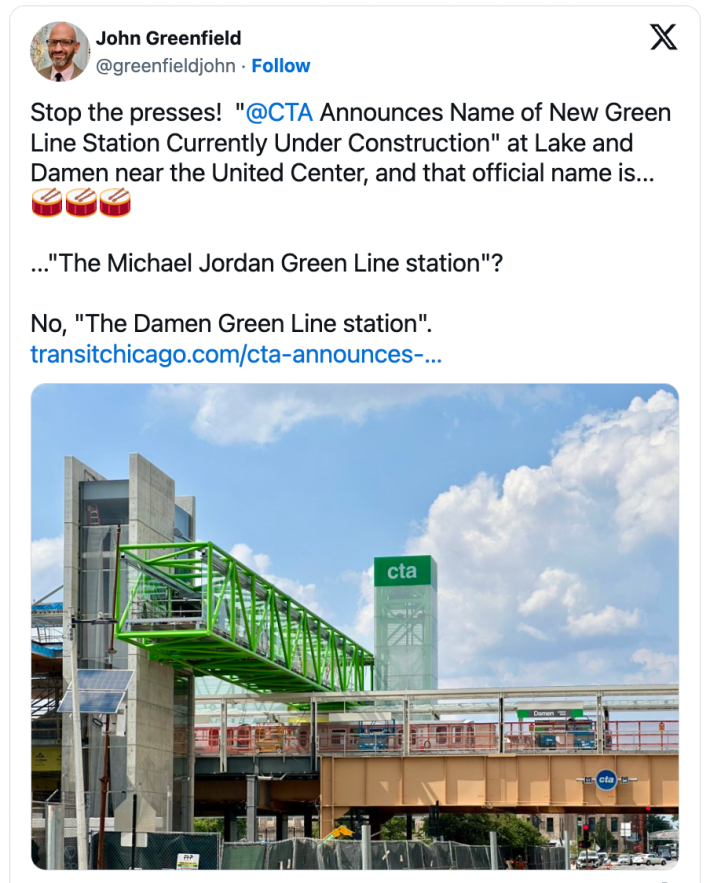
Not only is that an unimaginative name, but it's also a potentially confusing one.
With a few exceptions, 'L’ stops have been named after the streets they serve, which led to some repetition. Notoriously, there are five stations named "Western," and two of them are on the Blue Line.
The "Damen" station situation will be almost as bad. Visitors going to sports events or concerts at the stadium could possibly mix it up the new Damen stop with eponymous 'L' stops on the Pink, Blue (O'Hare branch), and Brown Lines.
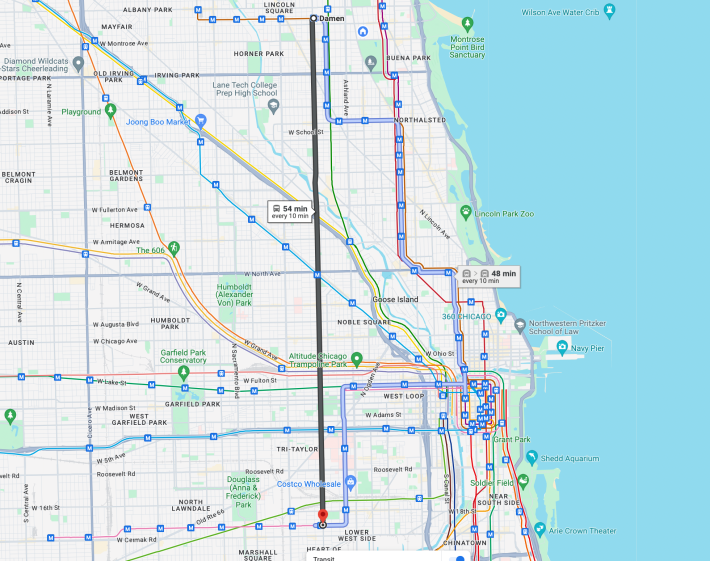
So why didn't the CTA at least call this station "Damen/Lake" or something to avoid bewildering inexperienced riders? There is some precedent for the agency using intersection names for official station names. That's mostly in the Loop, such as the "State/Lake" and "Washington/Wabash" stops. But the Green Line also has, for example, the "Ashland/63rd" and "Harlem/Lake" stations.
But CTA chose to stick with just plain “Damen” as the official name for the new stop that will be used on station signs and system maps. Agency spokesperson Catherine Hosinski told the board that they wanted to follow the Lake Street branch’s general pattern. Aside from "Harlem/Lake" and "Conservatory-Central Park Drive", it sticks with single-street names.
She later told Streetsblog that CTA officials also felt that the three other "Damen" stations are far enough away from Lake Street that riders aren’t likely to confuse them. The Pink (near 21st Street) and Blue (near North Avenue) stops are each roughly two miles away from Lake.
Hosinski pointed to the Red Line's Sox-35th station and the Green Line's 35th-Bronzeville-IIT stop as an example of a situation of when the stations were close enough to each other (0.2 miles away) to warrant more distinct names. The exact same thing is true for the Red Cermak-Chinatown and Green Cermak-McCormick Place stations.
Pastor replaces pastor
New CTA board member Michael Eaddy pastors at East Garfield Park’s People’s Church of the Harvest. He is a major figure in Chicago West Side’s faith community and no stranger to West Side politics. Mayor Brandon Johnson appointed him to replace another East Garfield Park faith leader, Rev. Johnny Miller of Mt. Vernon Baptist Church.
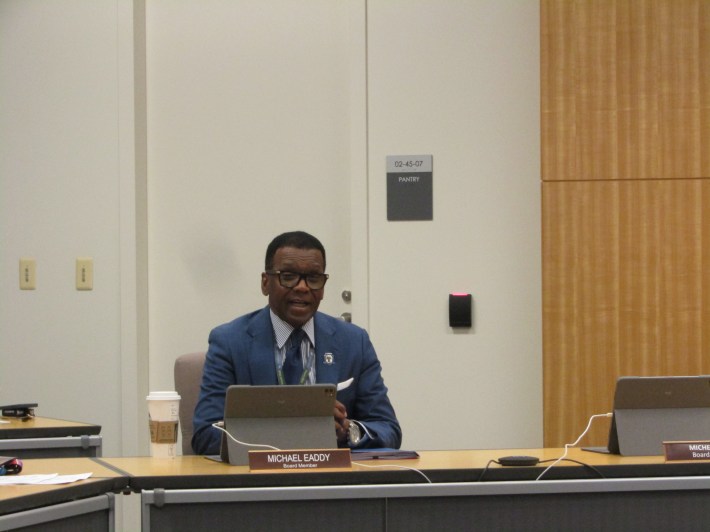
While Eaddy’s appointment sailed through the City Council, it led to increased scrutiny of who gets appointed to transit boards. As Block Club previously reported, the history of the CTA board is heavy on politically connected insiders and light on transit experts.
Johnson nominated another West Side faith leader and political supporter, Rev. Ira Acree of Austin’s Greater St. John Bible Church to the Regional Transportation Authority board. This time there was pushback from transit advocates and aldermen after Acree admitted he rarely uses the CTA, and was unaware that the region's transportation system has a looming $730 million fiscal cliff. Acree eventually decided to withdraw.
When the CTA board welcomed Eaddy at the start of yesterday's meeting, board president Lester Barclay did not address the recent controversy over pastors with no transit expertise joining transit boards. He emphasized the pastor’s "extensive community development and outreach experience," mentioning his workforce development programs, services for kids, anti-violence initiatives and the Harvest Homes affordable housing development spearheaded by the company Eaddy heads. "On behalf of the board, we want to welcome you, Director Eaddy, and we look forward to working with you," Barclay said.
"It's quite a privilege and an opportunity to be able to serve the city of my nativity in this significant role," Eaddy said. "I certainly want to thank Mayor Johnson for giving me this opportunity. I look forward to working that role."
Streetsblog attempted to interview Eaddy after the meeting, but the CTA communications staff said he wasn’t available for comment at this time, and that we should submit an interview request.
Regional Day Pass Pilot
The new regional one-day pass is something that eluded Chicago-area transit for decades – a pass that would work on CTA, Metra and Pace. The fact that Metra uses distance-based fares and CTA and Pace charge per ride has always been a stumbling block. Up until now, the closest the systems got to a universal pass is a Metra Monthly Pass paired with a $30 Regional Connect pass for unlimited rides on the CTA and Pace. However, the former was discontinued as part of Metra's 2024 fare revamp.
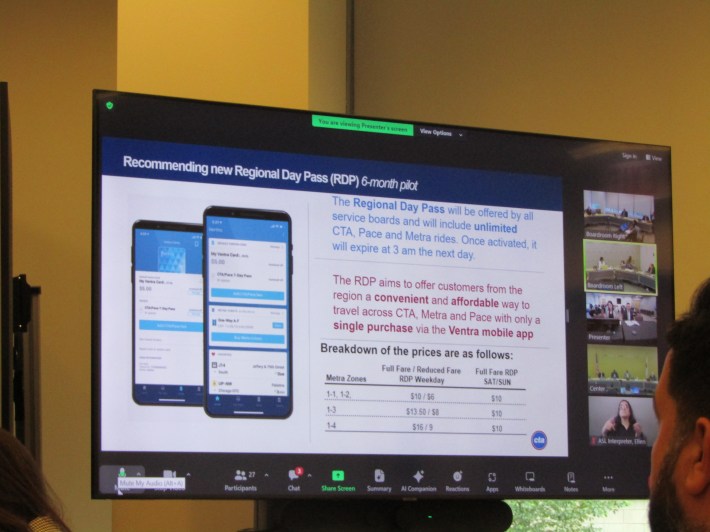
On weekdays, the Regional Day Pass costs the equivalent of a zone-based Metra day pass, plus $2.50. In other words, passes for fare zones 1-2 and fare zones 2-4 will be $10, passes for fare zones 1-3 will be $13.50 and passes for fare zones 1-4 would cost $16, On weekends, all passes will cost $10 (the cost of $7 system-wide one-day weekend pass plus $3). Also, unlike Metra day passes, it will be exclusive to the Ventra app.
At the board meeting, CTA Chief Innovations Officer Molly Poppe described the Regional Day Pass as a good deal for CTA riders wishing to travel within Chicago. It would be $2.50 cheaper than buying a $7.50 Metra day pass (Chicago and its neighboring suburbs fall within Fare Zone 2) and a $5 CTA/Pace 1-day pass.
The RTA will reimburse the three agencies for up to $1 million in lost revenue. Poppe said that the CTA believes that there is a market for riders taking the system over the weekend, as well as commuters for whom a Metra monthly + Regional Connect combo wasn’t worth the expense.
Director Roberto Requejo asked what benchmarks the CTA will use to judge the pilot’s effectiveness. Poppe said they would look at "linked trips" – trips also using Metra and CTA – and the use of one-day disposable "paper" passes riders can currently get at Ventra vending machines.
Eaddy said that having RTA compensate CTA for lost revenue "was a good move. You are to be commended for this."
This led CTA president Dorval Carter to say that financial support is key to inter-agency collaboration. "The truth of the matter is, when we have the money to support the things we're doing, it’s easier to get the agreement on the policy side," he said.
Vending machine equity
During the meeting, the transit board approved a new contract for two vending machine operators. These are Farmer’s Fridge, which sells freshly made salads, soups, and snacks (which riders aren't supposed to eat on trains or buses); and Fuze Technology, which operates phone charger vending machines.
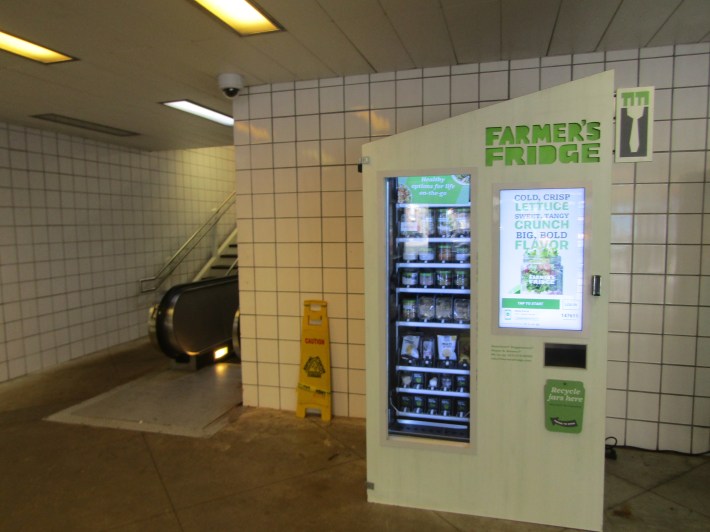
CTA Chief Financial Officer Jeremy Fine told the board that Farmer’s Fridge has had two vending machines at 'L' stations since 2019 – one at the Fullerton Red/Brown/Purple station and one at Damen Pink station. Under the new contract, the vendors agreed to each add one machine to the 95th/Dan Ryan Red station, a major Far South Side transit hub.
Fine mentioned that the Farmer's Fridge machine would, in a small way, help "address some food desert issues" in a part of Chicago where grocery stores and places that sell healthy food are in short supply. That is why, he said, CTA "will continue to press Farmers Fridge to expand the number of machines through the system."
Fine said the CTA gets a $50 per machine monthly fee, plus 3 percent of the sales revenue. He added that the agency made roughly $7,000 this way so far, and they expect to earn about $1,800 a year in the future.
When the discussion turned to the charging station vending machines, Requejo pressed Fine on the shortage of machines at South and West Side stations. "We're working with Fuze to have distribution across the entire system, and specialty focus on the South and West sides," Fine replied.
When Requejo asked whether equitable vending machine distribution is something the CTA requires of the contractors, Fine responded that it's an expectation that’s communicated clearly to the vendors, but the transit agency isn’t micro-managing where the machines go.
Eaddy pressed Fine on what the processes are for deciding where the machines should go, and whether the vendors look at foot traffic. The CFO responded, "We work with them closely" to make sure they get the information.
Carter said that the CTA makes it clear to vendors that "If you want to locate at Clark/Lake, we also expect you to have a location at Pulaski or something like that." He didn’t specify which of the four Pulaski stations he was referring to, but all of them are located in either majority-Black or majority-Latino communities. So his point that the machines should be installed in diverse locations, not just potentially lucrative downtown sites, applies to any of those Pulaski stops.

Did you appreciate this post? Please consider making a tax-deductible donation.
